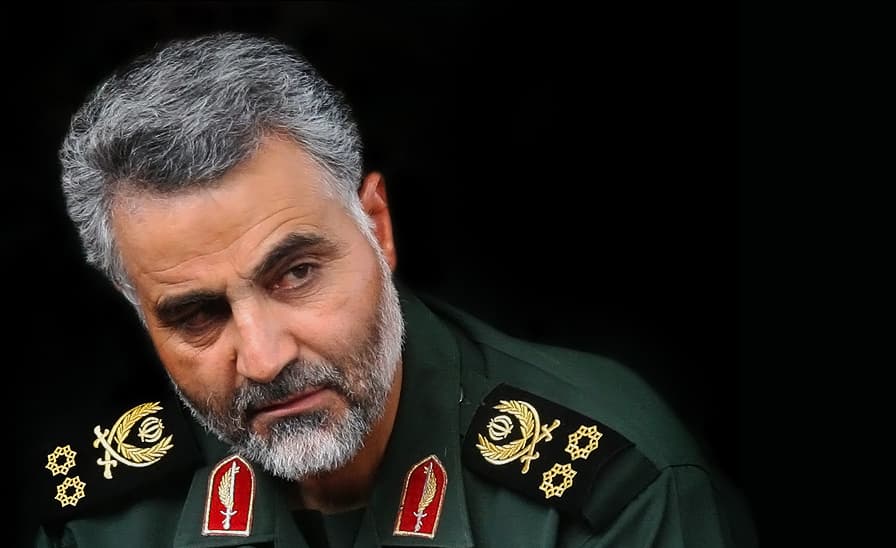Soleimani’s Death a Precursor to Iran’s Strategic Setback After Syria’s Fall
Iran’s regional ambitions, which involved massive usurpation of Syria’s sovereignty, have been in slow-motion free-fall since the 2020 death of Quds Force leader Qassam Soleimani.

The fall of the Assad regime after 54 years in power is not only internal rot but a festering symptom of the disarray of Iran’s Quds Force following the 2020 assassination of Qassam Soleimani, ordered by the Trump administration.
The rapid felling of cities leading to Damascus, and Bashar Assad’s rushed flight to Moscow on Saturday, may seem sudden, but Iran’s regional ambitions, which involved massive usurpation of Syria’s sovereignty, have been in slow-motion free-fall since Mr. Soleimani’s death.
For years, Mr. Soleimani had been building regional relationships with key figures like Hassan Nasrallah and Bashar al-Assad. These bonds permitted Iran to wield authority and coordinate sophisticated operations across multiple theaters.
“The current developments in Syria offer compelling proof of the Quds Force’s decimated capabilities in the post-Soleimani period,” said Chief Operations Officer for the Middle East Forum, Gregg Roman, told The New York Sun. “Soleimani’s removal produced a command gap extending beyond tactical organization.”
Iran’s Quds Force, the international and strongest component of Iran’s Revolutionary Guard Corps, has been central to Iran’s extraterritorial military operations since its founding in the 1980s. The force has spent billions of dollars on militias and military aid training proxies, coordinating intelligence, and leading strategic operations. Its field operatives include Houthis in Yemen and Hezbollah in Lebanon.
Syria served as a crucial land passage for Quds to transport weapons and militants to Hezbollah. With Damascus now under rebel control, Tehran’s “axis of resistance” against Israel and the West faces unprecedented jeopardy.
“The collapse of Assad is akin to punching a critical hole in Iran’s contiguous sphere of influence in the northern rim of the Middle East extending to the Eastern Mediterranean,” Senior Director of Eurasian Security and Prosperity at New Lines Institute for Strategy and Policy at Washington, Kamran Bokhari, told the New York Sun. “Tehran’s ability to support Hezbollah at a time of unprecedented damage to its premier proxy has been severely degraded.”
Mr. Soleimani’s assassination had “greatly affected” the morale of Shia-aligned outfits across the region, a leader of the Iran-backed Kata’ib Sayyid al-Shuhada militia in Iraq, Sheikh Kataib, said.
“He was our Jihadi father; he was the faithful Qassem Soleimani. He was a person we loved very much; even his enemies who met him came to love him,” Mr. Kataib told this reporter during a trip to Baghdad in 2022. “Qassem would come and say hello to the leaders. But then he also said hello to the cooks and cleaners; he would kiss them. He was a supporter of the oppressed. These men died poor when they could have earned so much.”
Mr. Soleimani’s successor, Esmail Qaani, had not garnered the same respect and following, according to Mr. Kataib.
Even before Syria’s collapse, Iran’s forces had suffered significant losses. On April 1, in response to attacks on multiple fronts, Israel struck Iran’s diplomatic mission in Damascus, killing key Quds Force leaders who oversaw operations in Lebanon, Syria, and Gaza and disrupting Iranian logistics. In November, Quds senior commander Kiomars Pourhashemi was killed on a battlefield near Aleppo.
Mr. Assad turned to Tehran in 2011 at the start of Syria’s civil war. Iran invested heavily, seeing Syria as crucial for coordinating with Hezbollah and as a weapons pipeline to assert its hegemony in the region. On Friday, the Syrian dictator reached out to Tehran for assistance. It was too late.
“We should have prevented this situation,” Iran’s former deputy head of the Ministry of Intelligence and former Quds Force deputy under Soleimani, Mohammadreza Gholamreza, acknowledged on Iranian state television.
While Mr. Soleimani’s death had a significant impact on the weakening of Quds’ missions, Mr. Bokhari noted that Syria’s fall followed a “considerable degree of miscalculation and overreach on the part of Iran.”
This included underestimating Israel’s response to Tehran’s three-pronged strategy to undermine Israel and the West — Hamas’ attack on October 7, Hezbollah’s attempt to capitalize on Israel’s northern front, and the Houthis’ disruption of Red Sea commercial shipping.
“That strategy elicited a massive response from Israel, which the Iranians and their allies could not withstand,” he said.
With Assad’s downfall and Iran’s degradation, Israel can better enforce the Lebanon ceasefire and prevent Hezbollah’s rebuilding, but regional tensions remain.
“By wiping out Syria’s air defenses, Israel has a clearer path, literally, to attack Iran’s nuclear program,” said Director of Foreign Policy for the Jewish Institute for National Security of America, Jonathan Ruhe. “But Saudi Arabia and other Arab states are distancing themselves from Israel mostly over Gaza, which has its own ceasefire considerations.”
Iran, backed by the United Nations, warned Israel that any efforts to protect its flank on the Golan Heights by moving farther into Syria would be a violation of the 1974 disengagement deal.
A leading Houthi commander wrote in an encrypted message to the Sun that Iran’s support for the Houthis is largely overblown and Syria’s collapse will have little impact on its operations. The group will continue targeting Israel and America’s Navy ships in the Mediterranean Sea.
“Syria does not affect us in any way, as the repercussions of the situation in Syria on Yemen are very far away, both geographically and practically,” the commander wrote.
Even with diminished capabilities, Iran has proven remarkably adaptable in the face of heavy sanctions and international isolation.
Tehran is scrambling to open a “direct line of communication” with the new Sunni-dominant leadership. Iran’s Foreign Ministry said this week that it respects Syria’s unity and national sovereignty. It also urged “the swift end of military conflicts, the prevention of terrorist actions, and the commencement of national dialogue” with all segments of Syrian society.
“Iran will seek to retain its capacity … under the new order in Syria, including exploring partnerships with Sunni extremist groups as it has done in the past with the Taliban and Al Qaeda,” Policy Director of United Against Nuclear Iran, Jason Brodsky, told the Sun. “Likewise, it will seek to protect its interests by maintaining connections with the existing Alawite and Shiite communities in Syria.”
“We’re witnessing decreased operational effectiveness rather than a complete dissolution of Iranian influence,” Mr. Roman said.

